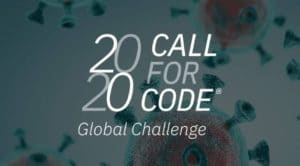While governments and global pharmaceutical corporations search for an ultimate long-term solution, a life-saving vaccine, response to the COVID-19 has thrown up many near-term challenges. Prize challenges communicated through mass digital connectivity have given a vast army of people an opportunity to mobilise and pool their collective intelligence and insight. In this case it includes professional experts in many fields, largely unqualified though knowledgeable citizen scientists, and front-line workers, primarily though not exclusively in health and social care. They all want to make their contribution to a collective effort, rather than passively sit back.
Sadly, we have been here before, though missed some of the lessons that could have been learned from the Ebola Grand Challenge crowdsourcing initiative led five years ago by the U.S. Agency for International Development (USAID) to tackle the Ebola outbreak in Africa.
This time round, the truly global nature of the disease has prompted a truly global search for solutions to a variety of issues. A look at the projects assembled on the HeroX prize challenge platform shows a wide range, demonstrating the flexibility and adaptability of open innovation as a business tool for seeking solutions.
HeroX is hosting challenges posted by global corporations, including pharmaceutical companies; famous educational establishments; governments and their agencies; and even challenges launched by some of their open-innovation-platform rivals!
The issues the various challenges tackle include how to treat patients and the virus itself, how to track its spread to learn vital information on contagion and incubation rates, how to communicate required behavioral measures to communities most effectively, and how to better protect frontline workers dealing with the public in any capacity.
Let’s take a look at some.
Corporations
Major corporations including IBM and Roche are seeking crowdsourced solutions to coronavirus-related issues.
 In IBM’s case, they run an annual challenge on HeroX. This year’s one is about writing code, because when a new disease such as COVID-19 emerges, communications systems are one of the first systems to become overwhelmed. Their “Call for Code” challenge asks innovators to create practical, effective, and high-quality applications based on one or more IBM Cloud™ services (for example, web, mobile, data, analytics, AI, IoT, or weather) that can have an immediate and lasting impact on humanitarian issues. The total prize purse is $270,000, and the challenge is open for submissions until July 31, 2020.
In IBM’s case, they run an annual challenge on HeroX. This year’s one is about writing code, because when a new disease such as COVID-19 emerges, communications systems are one of the first systems to become overwhelmed. Their “Call for Code” challenge asks innovators to create practical, effective, and high-quality applications based on one or more IBM Cloud™ services (for example, web, mobile, data, analytics, AI, IoT, or weather) that can have an immediate and lasting impact on humanitarian issues. The total prize purse is $270,000, and the challenge is open for submissions until July 31, 2020.
The challenge issued by Roche (Canada) was to submit ideas by April 10 on a broad set of matters, including personal hygiene regimes and social distancing; how to manage limited health system resources; and advice for managing rural and remote populations (including indigenous Innuit Canadians).
Educational institutions
Leading educational establishments have launched prize challenges, including MIT and the New York Academy of Sciences.
The MIT Solve challenge was open to anyone, anywhere in the world, and based around two aims: How to protect vulnerable populations from the effects of COVID-19; and How to support hospitals with shortages of staff, supplies, and resources. The deadline for submissions was April 5. The selected finalists will pitch their solutions to a live audience of 400+ leaders and expert judges at Solve Challenge Finals in September in New York, and the winners will receive a share of a prize fund of over $1 million.
And if anyone felt that contributing to the solutions was beyond them, they could still be involved (and feel some added self-worth) through making a cash donation to the prize money that was offered to incentivise solution providers. The facility to make a donation remains open.
 The New York Academy of Sciences challenge is aimed at encouraging 13-17 year olds around the world to form virtual teams and develop technology-based solutions that would slow the spread of COVID-19. As well as creating the technological end-solutions, the students will learn first-hand about collaboration and the benefits of harnessing collective intelligence. These long-term traits will serve them well in their future study and work environments.
The New York Academy of Sciences challenge is aimed at encouraging 13-17 year olds around the world to form virtual teams and develop technology-based solutions that would slow the spread of COVID-19. As well as creating the technological end-solutions, the students will learn first-hand about collaboration and the benefits of harnessing collective intelligence. These long-term traits will serve them well in their future study and work environments.
The submissions deadline is May 6, with winners announced in June 2020. Among the variety of prizes available, each member of the winning team will receive a $500 travel scholarship to attend the Global STEM Alliance Summit at the New York Academy of Sciences.
Other innovation platforms
HeroX is supporting challenges launched by two of its rival platforms – InnoCentive and Topcoder.
InnoCentive describes itself as “the global innovation marketplace where creative minds solve some of the world’s most important problems for cash awards.” One of three InnoCentive projects hosted by HeroX is their own challenge, seeking ideas for less well communicated methods of reducing the physical risk of transmission of the coronavirus from physical contact with contaminated surfaces or people. Submissions are required by May 24.
There is no guarantee of any prize money, though short-listed solutions will be offered to global health organizations (e.g. WHO, NIH, CDC), Governments and city authorities to be potentially implemented. allowing scope for solution providers to reach commercial agreements. Solution providers will retain intellectual property over their ideas, though the act of submitting them is taken as agreement that any organisation that wants to implement an idea will be automatically granted a licence to do so.
Governments
Governments and their agencies who are using prize challenges include the national government of India, the National Research Council of Canada and New York State.
The Indian Ministry of Health and Family Welfare embarked on a broad trawl among Indian individuals and startup businesses for any solutions to help fight Covid. Incentive prizes range from 25,000 to 100,000 rupees (US$330 to US$1,320). Submissions were required in the form of a maximum of three A4 size pages using Font Arial Size 12px, or a YouTube link of no more than 3 minutes duration, by April 15. A deadline for the award of the prizes is not yet available.
Crowdsourcing, and specifically open innovation prize challenges, is allowing the public at large to collaborate and contribute to COVID-19 solutions on a wide ranging scope and scale. It doesn’t have to already be someone’s job for them to take part, nobody needs any formal qualifications, and nobody needs to receive permission to take part. It is channeling a collective output of people’s willingness to share ideas and knowledge to contribute to saving lives.
Main image source: MIT Solve






0 Comments